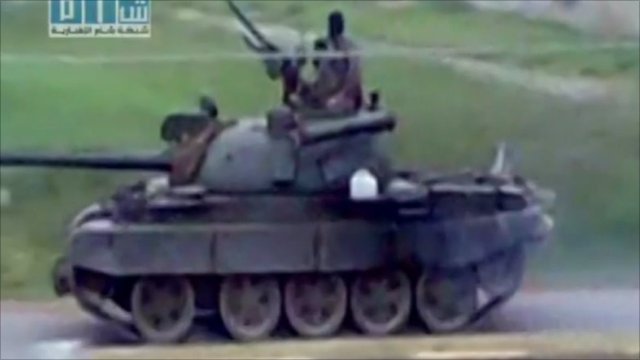 Heavy shooting has been heard in a western suburb of the Syrian capital, Damascus, after the army cordoned off the area, human rights activists say.
Heavy shooting has been heard in a western suburb of the Syrian capital, Damascus, after the army cordoned off the area, human rights activists say.
Security forces are also continuing their efforts to crush anti-government protests in the central city of Homs, Deraa and the coastal town of Baniyas.
On Sunday, there were reports from Homs of gunfire, arrests and deaths, including that of a 12-year-old boy.
State media also said 10 labourers had been killed in an ambush by gunmen.
Foreign journalists have not been allowed to enter Syria, so the reports are difficult to verify independently.
Communications cut
On Monday morning, reports from activist websites said that the suburb of Muadhamiya, west of Damascus, was cut off by the army.
Soldiers and tanks were deployed on the town's main streets and outside mosques, and snipers were positioned on tall buildings, the websites added. There was also a large number of arrests reported.
Heavy gunfire could be heard and clouds of black smoke were hanging over the area. Electricity and telephone lines were cut off.
Clashes were also reported in the nearby suburb of Darayya.
Meanwhile, more security forces were reported to have moved into the central city of Homs, north of Damascus, where troops backed by tanks have been raiding houses and arresting people since Saturday night.
On Monday, a resident told the BBC that the security forces were dividing up the city to prevent people joining any mass protests.
"There is the sound of tank-fire and gunfire coming from the outskirts of the city. Last night, there was continuous gunfire for several hours," he said. "There is no electricity or mobile phone coverage."
The UK-based Syrian Observatory for Human Rights said on Sunday that the areas of Bab Sebaa, Bab Amro and Tal al-Sour were under "total siege", and that hundreds had been arrested. The number of casualties was unknown, it added.
Some 15 people were said to have been shot dead in Homs on Friday after taking part in demonstrations following Friday prayers.
"We cannot stay for a long time faced with these guns - somebody from... other nations, from Turkey, should [do] something," the Homs resident added. "This government should protect [its people], not kill them."
The army said operations against "armed terrorists" were continuing.
A Washington-based Syrian human rights activist, Radwan Ziadeh, told the BBC the situation was very alarming.
"The number of deceased is escalating and there is no change in the Syrian regime's policy towards the peaceful protest," he said.
Dissident charged
Six soldiers and police had been killed and others wounded on Sunday in Homs, Baniyas and villages around the southern city of Deraa, it added.
Activists said hundreds were arrested in Baniyas on Sunday, including a 10-year-old boy. At least six protesters were killed on Saturday, they added, including four women taking part in a small all-women rally.
On Monday, water, electricity and telephone lines were cut in the town.
In Deraa, which has been under military occupation for two weeks and where scores of protesters have been killed, residents were allowed out for a few hours to buy supplies before a curfew was imposed.
A witness also told the Reuters news agency that security forces had killed two protesters in the eastern town of Deir al-Zour.
Meanwhile, Syrian state TV showed pictures of a minibus in which 10 Syrian workers coming home from Lebanon were said to have died when it was ambushed near Homs by gunmen early on Sunday morning.
And the prominent dissident Riad Seif, who is suffering from prostate cancer, was charged with staging a protest without a permit.
The BBC's Jim Muir in Beirut says demonstrations and protest vigils have been reported in many parts of the country as the crackdown continues.
Activists say hundreds have been arrested, but information about casualties is sketchy because communications are largely cut off, our correspondent adds.
The Syrian human rights group, Sawasiah, believes more than 800 people have been killed since pro-democracy protests began in March, including 220 killed in an army assault on Deraa. The US has said the crackdown is "deplorable" and pledged a "strong international response".
The government disputes the civilian toll and says about 100 soldiers have been killed.
The unrest poses the most serious challenge to President Bashar al-Assad since he succeeded his father, Hafez, in 2000.
Mr Assad was quoted by the al-Watan newspaper on Monday as saying he was confident the unrest would soon cease.
"The crisis will pass and end, and the question of administrative, political and press reforms will advance," he said.
Syrians must "consolidate national unity because the nation is the mother of all of us and we need to unite in the face of this plot," he added.



